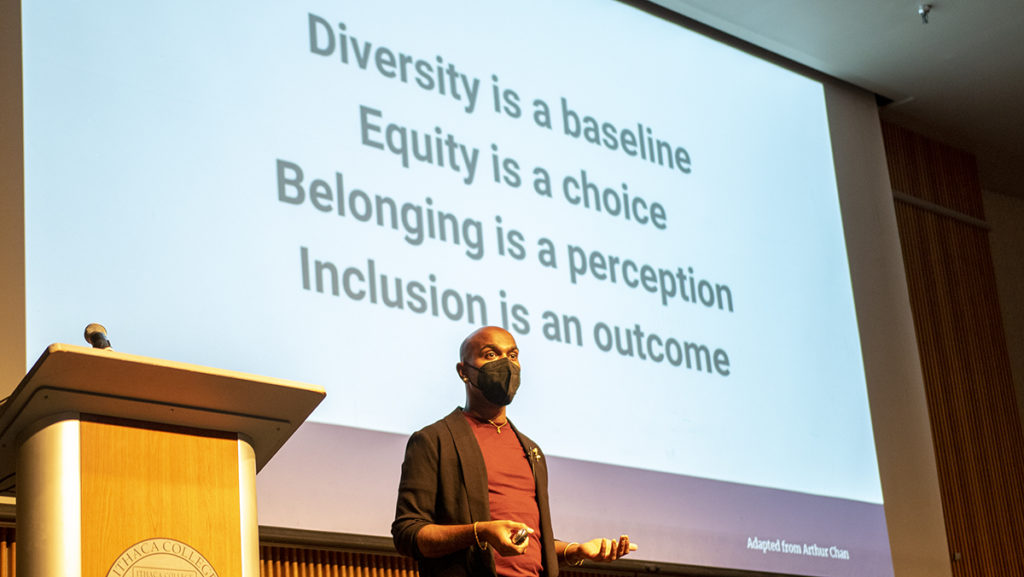Raja Gopal Bhattar, a diversity, equity and belonging strategist and an inaugural Racial Equity Fellow with InterFaith Youth Core’s Interfaith America initiative, spoke to members of the Ithaca College community about incorporating equity, inclusion and belonging into learning environments.
The event, held Feb. 14, was part of the Difficult Dialogues: Cultivating Cultures of Belonging Symposium — an event created to facilitate discussion of complex and controversial subjects by bringing guest speakers to campus to address challenging subjects. Bhattar’s work combines qualitative and quantitative approaches to intersectional identity, with a focus on the experiences of LGBTQ+ people, immigrants, first-generation students, international students and people of color in higher education.
Interim Provost Melanie Stein gave the introduction, noting the relevance of the conversation as educators grapple with the after-effects of COVID-19 on classroom learning.
“Our campus commitment to diversity, equity and inclusion is reflected squarely in our strategic plan and is one of the priorities identified by the Senior Leadership Team this academic year,” Stein said. “Recent events on campus and nationally illustrate that inclusivity is not yet embraced by all. As educators, our classrooms remain one of our most powerful tools to advocate DEI [Diversity, Equity, Inclusion].”
The conversation comes following the discovery of two swastikas drawn inside buildings on campus. Interim President La Jerne Cornish condemned the first swastika in an email to the campus community Feb. 4. Following the discovery of the second swastika, the Office of Public Safety and Management sent out an alert Feb. 8 to the campus community.
Rather than sending out newsletters, Bhattar said it was equally important for colleges to educate people on the history behind issues of importance –– like the swastika — allowing growth, opportunity and progress to take place.
“What are we doing to be properly educated?” Bhattar said. “What is the actual history of the symbol and other symbols that we use, and how [does] that actually transform and make people feel uncomfortable?”
Bhattar emphasized the point that there is still a lot of work to be done in terms of cultivating a culture of belonging, with the goal being to respect the process, growth and progress that will occur along the way.
“What is the concept we want to foster and how are we intentionally defining, redefining and engaging our shared commitment to those values and are we actually all on the same page or not?” Bhattar said.
Bhattar raised several questions to the audience, like which of their identities they think about most often and which they do not. The purpose of the exercise, they said, was to get people thinking about what it means to feel a sense of belonging on college campuses.
“I believe that it’s important for us to recognize that mattering is an active process and marginalization is an active process,” Bhattar said. “We think of them to be automatic, unintentional experiences, but often are grounded in where and what we do.”
One of the ways Bhattar encouraged this was through faculty interactions with students. They said finding ways to better support the students who are already enrolled at the college will naturally help to build more diversity by attracting students.
“Rather than saying we have to get them in the door, you have to think about how are they being supported? How are they thriving? [Are they] mattered on campus and how are they being marginalized,” Bhatter said.
Bhattar also said that while diversity is a baseline for colleges, equity is a choice that requires intentional work to ensure that it can be met.
“I believe that we have to be equity minded … and be willing to challenge the status quo of everyone gets the same thing,” Bhattar said. “That is not the world we live in and our journey and our role as educators as you transform is to be more equitable.”
One audience member commented on the need to provide more critical resources for students to embrace equity.
“So much of what we see in classrooms is the difference between first generation versus multi-generational learners,” they said. “This intersectionality … is such a big part of our work.”
Bhattar left the audience with several key questions to consider in academic work: asking whose perspectives are not at the table, what is your own framework, and how can you foster a community guided by an equity framework.
“As we think about what it means to engage in this work … I believe that leading with intention that aligns as closely as possible with impact — impact is not always what the intention is — that does not deny the impact nor the intention, but it is the mixing of both,” Bhattar said. “Our job is to align more closely with the impact that we want to have so that our intention can be transformed within our community.”









